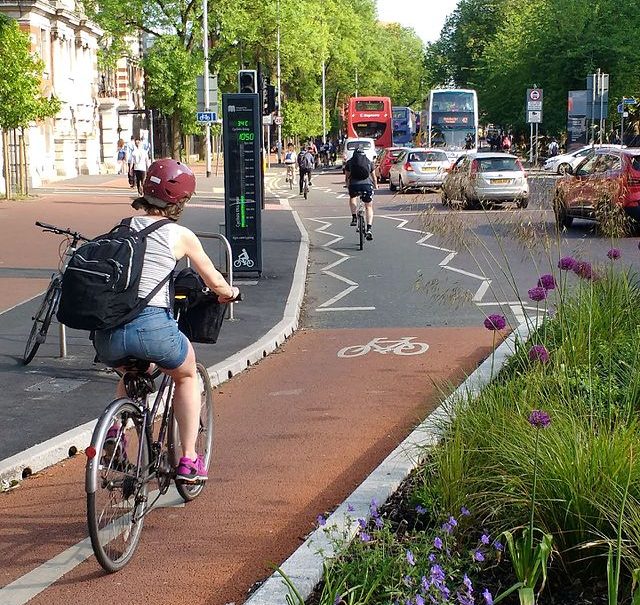Last December, the first ever European Capital of Cycling was announced. Not Amsterdam, not Copenhagen, not Brussels: Manchester. Six months on, Mancunian Matters takes a look at the state of cycling in the city – and takes a Bee Bike for a spin.
It’s a good time to be a cyclist in Manchester. Miles upon miles of cycle lanes are being built; there are racks of bikes for hire around the corner; and the city’s just been named the first ever European Capital of Cycling.
And it’s not stopping there. The council’s plans for transport in Manchester are ambitious: it wants to double the current share of journeys made by bike by 2028; wants the city to be zero-carbon by a decade later.
Constantly under criticism for either doing too much or too little for cycling – with the answer depending on who you ask – it makes a point of celebrating its every success.
“Cycling in Manchester is booming,” the title of a press release from last autumn read, proudly announcing that the number of journeys along the Oxford Road Cycle Route had surpassed a million on October 20 – a month earlier than 2022, “smashing” the previous record.
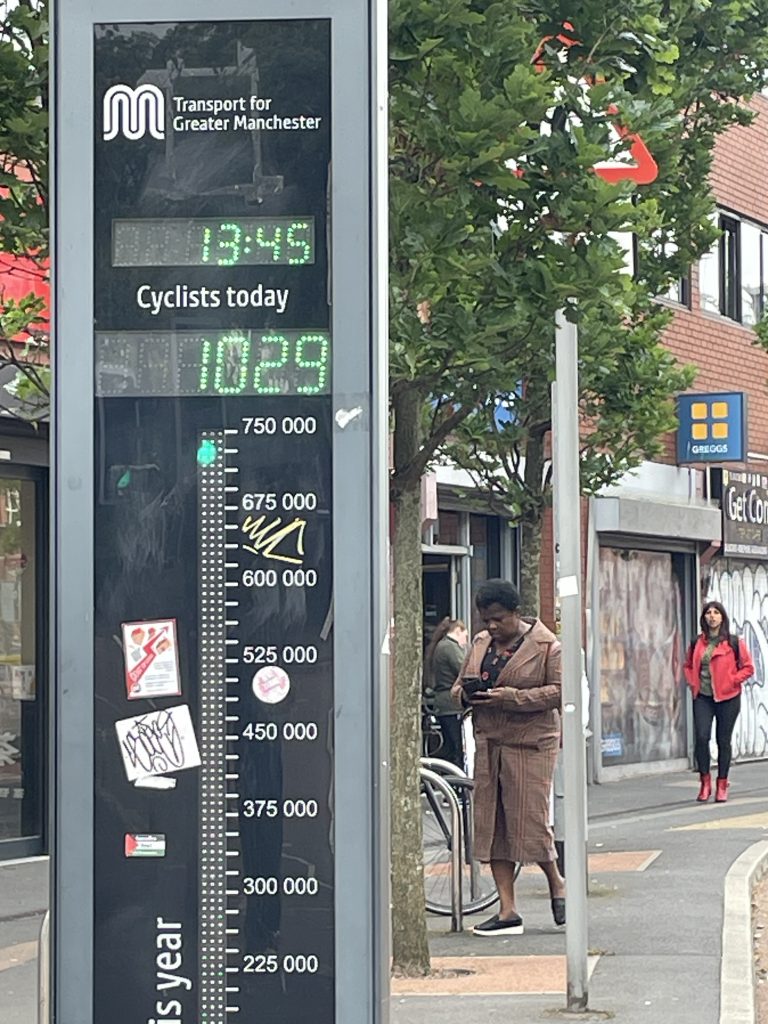
It also reported that more than 6,000 people had used the route on nine separate days between September and October.
The stretch of road – known as one of the busiest bus corridors in Europe – was choked with construction work for several years in the mid-2010s in order to accommodate Dutch-style cycle lanes, which give riders more space from the traffic roaring past.
Now, similar schemes like the Chorlton Cycleway are now being rolled out in other areas of the city. The council’s championing of the successful Oxford Road scheme seems to say: we know it’s inconvenient now, but hold tight, it will be worth it.
But is cycling in Manchester really booming? Not quite, according to the data from SusTrans, the charity promoting walking, wheeling and cycling, which produces an annual survey crunching the numbers on active travel in the region. Their most recent edition compared the 2023 figures against 2021.
While allowances must be made for the small sample size, as well as the impact of the pandemic – which saw a boom in people cycling for leisure, one of the few pastimes permitted under lockdown – the numbers paint a fairly dismal picture.
In a representative survey of 1,092 residents, the survey found that participation in cycling in Greater Manchester has dropped since 2021. In 2023 just 10% of residents reported cycling at least once a week, a fall of 3% from two years previously. Around 45% of residents surveyed said they did not cycle and had no interest in taking it up, compared to 29% who said they were non-cyclers but were interested in starting.
It’s also not a level playing field: just 6% of women surveyed said they cycled at least once a week, compared to 14% of men. Similar proportions were reported when comparing white people with those from ethnic minority groups, and between disabled and non-disabled people.
Detractors of the council’s schemes may point to these numbers and ask why so much work is being done to accommodate a demographic that – if the survey is accurate – amounts to just a tenth of the population. But supporters would make the Field of Dreams argument: build it, and they will come.
And that’s exactly what the council is doing. On the TfGM site dedicated to the Bee Network (a joined-up London-style transport system for Manchester encompassing walking, wheeling and public transport), there are nine different schemes for active travel currently under construction across Greater Manchester.
A further 49 are in development; 93 separate schemes have already been completed. The full expansion of the Bee Network is set to deliver 1,800 miles of routes and 2,400 new crossings across Greater Manchester in the next ten years.
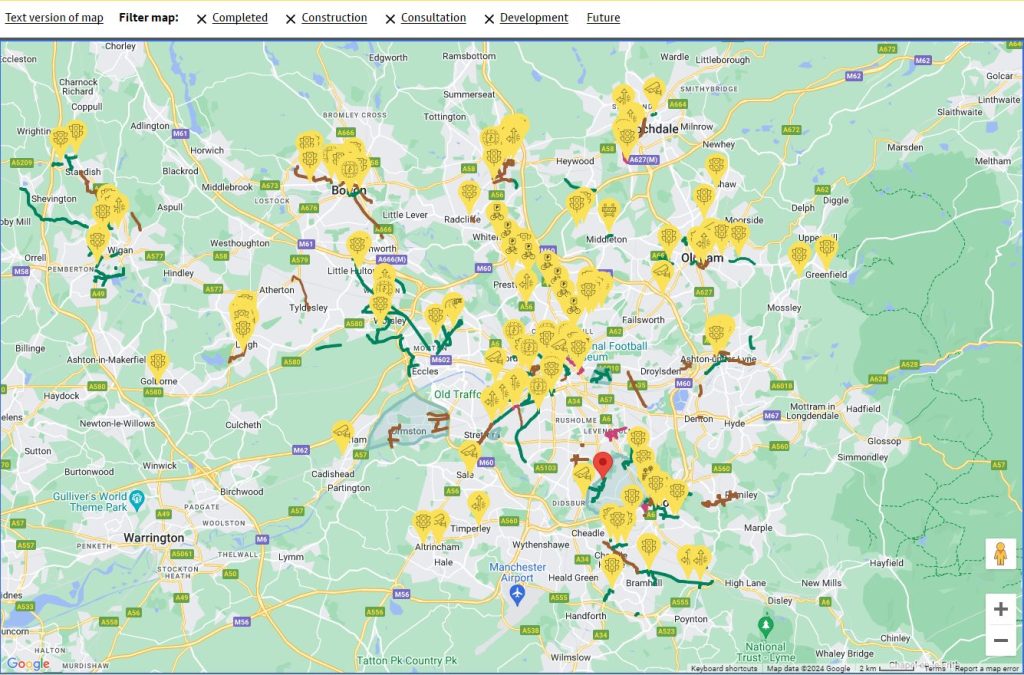
Is this why Manchester won the European Capital of Cycling bid?There’s little online to explain what the designation actually means – is it to recognise positive strides that have already been taken? Or is it to give councils and campaigners a focus to rally around – and hopefully attract additional investment?
Walk Ride GM, a campaign group pushing for better active travel infrastructure locally, were not involved with the campaign for the bid. Harry Gray, their Salford lead, said: “We’re happy with what Manchester is doing and with the direction we’re going in. But we were a bit surprised at the award.
“We do feel that it jumped the gun a little bit in terms of what Manchester currently offers – how far down the path it is regarding cycling and active travel infrastructure.”
Councillor John Hacking, Manchester City Council’s executive member for skills, employment and leisure, said: “The aim of our European Capital of Cycling year is to promote and develop cycling in the city to support residents of all ages to jump on a saddle. This might be for transport as an alternative to their car – or someone dusting off their old bike just for fun.”
“Throughout this year we want to bring about a shift in attitudes towards cycling and widen the numbers of people who participate – and feel there is a way for them to cycle safely”, he said.
“This is about creating opportunities for people to cycle, regardless of their experience through key investment in cycling infrastructure, improving access, and ultimately making Manchester an exemplar for cycling in the UK.”
The body behind the award, ACES Europe, is a non-profit organisation based in Brussels that is recognised by the European Commission. It bestows titles like World and European capitals of sport and describes its awards as “emotional tools” whose rewards seem to know no bounds: “International recognition, legacy, media impact, return of investment, active networking, improvement of local sport policies, liveliness to your city”, the website beams.
At the time the win was announced, the council called it “a hugely significant moment” for the cycling movement in Manchester, and said they were confident that the accolade “will act as a springboard for further investment and participation throughout the city.”
Whether that will ring true in the numbers is too early to tell. Gray tells me that the council have already installed counters on the Chorlton Cycleway, the controversial construction work upgrading Chorlton’s cycle lanes which received heavy criticism from local businesses and residents.
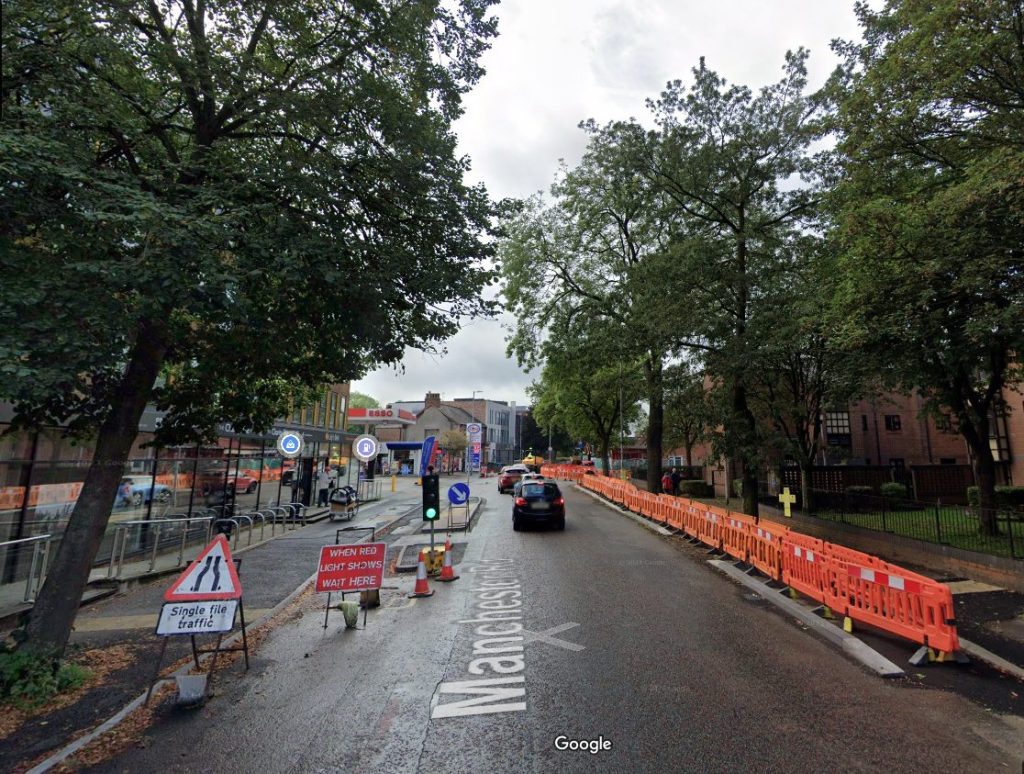
“We do think that it took too long to build”, Gray says. “The council have delivered similar infrastructure in Manchester which they’ve managed to turn around much quicker. So that frustration isn’t specific to cycle lanes.”
Of the criticism, he says: “It takes time for people to change their behaviour, and for things in communities to change. So there is going to be that waiting period, and we’re in that now.”
One project arguably changing how people travel are the Bee Bikes, Greater Manchester’s bike hire scheme. Costing 50p to unlock plus 5p per minute of your ride, all you need to do is download the app, link up a bank card, and off you go.
There are now around 1500 bikes at 257 docking stations across central Manchester. The council estimates that over 200,000 residents will be 5 minutes’ walk away from a docking station.
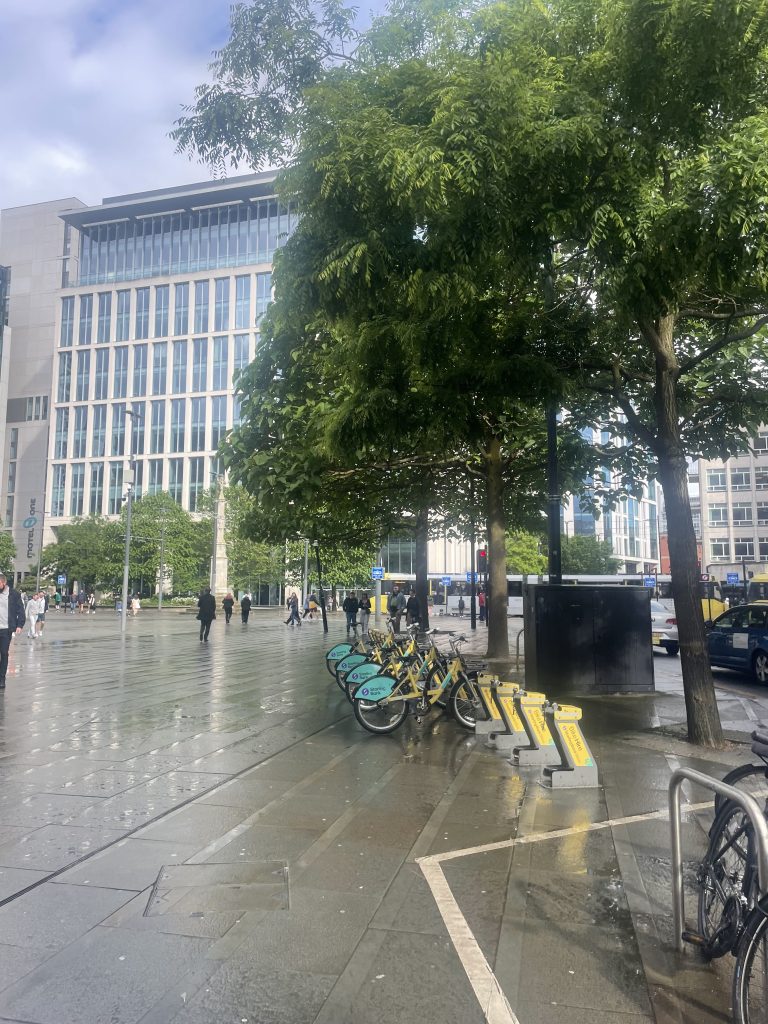
Since the scheme was launched in late 2021 it has not all been plain sailing, but the figures look positive – there have been nearly 600,000 rides since then, over 1.4 million kilometres ridden, and currently over 72,000 active users.
Dame Sarah Storey, the Active Travel Commissioner for Greater Manchester, reported in January that average ride time was between 10-15 minutes. This would suggest one of the mission statements of active travel – weaning people off the car for short journeys – is slowly starting to sink in.
Gray is broadly happy with the way things are going. “I think Greater Manchester has spent ten years nailing the formula of what the infrastructure looks like”, he says.
“Now we have that expertise and knowledge base, people in the council know what to deliver now. The problem comes down to the fact that there isn’t enough funding to deliver it.
It is hoped that more will come through the Trailblazer devolution deal later on this year. Grey acknowledges that within the region, the rollout of the works has been somewhat uneven. The cycle hire scheme, for example, is still fairly small, only touching three of the ten Manchester boroughs, though the council say expansion is part of its long term plan.
“I think it is a struggle with the outer boroughs. But we need that infrastructure in the centre to point to and say look, this is what we can build. In the past, we haven’t even had that.”
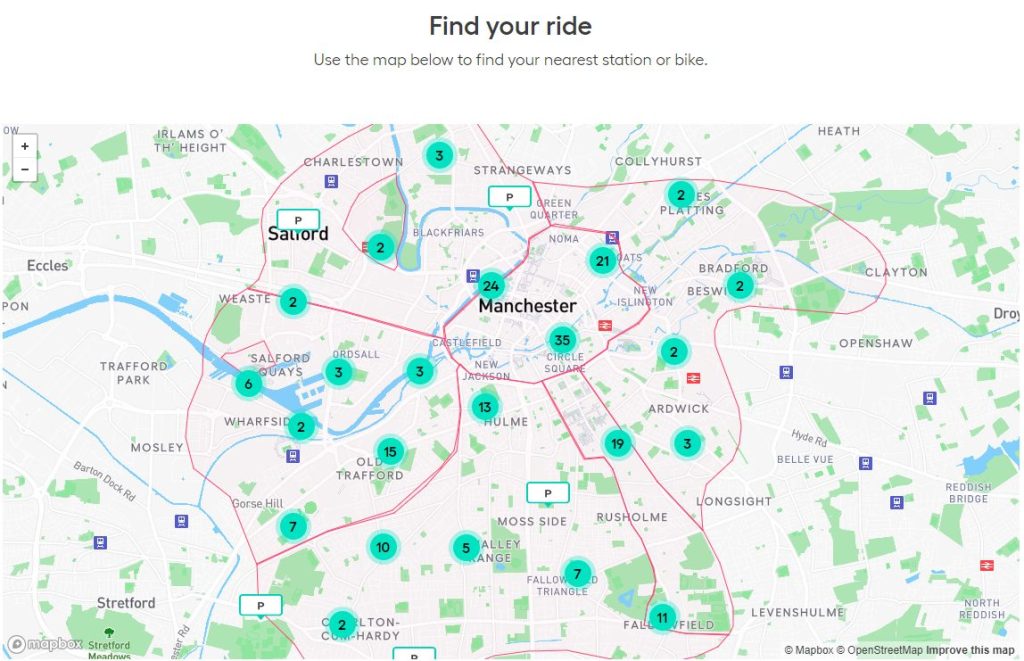
Back to Manchester’s new title, then. The website the council have set up in its honour looks chock full of news, events and opportunities: grants of up to £500 for groups engaging children in cycling; subsidised bike maintenance; free cycling lessons for all levels, complete with free equipment. At the point-of-use for the public, it does seem like the council are doing enough to earn their title.
But Gray is sceptical.
“There needs to be more events, more set-piece moments, that put the progress of Manchester as capital of cycling at the fore,” he says, giving the example of traffic-free days that other cities in Europe organise regularly.
“We haven’t seen that come back since COVID. Why can’t the council do that here? Promote the capital of cycling event in person as a real event rather than some sort of vague tagline on a t-shirt.”
Cllr Hacking is proud of what the accolade has already achieved. “In the first six months we have supported a wide range of cycling events, created new routes, opened new shelters and other infrastructure to help people embed cycling into their everyday lives, and worked with a range of schools”, he said.
“This is just the start though and we won’t stop after our European Capital of Cycling year comes to an end. Importantly we want to create a legacy for cycling that lasts into the future and ensure a step change for cycling in Manchester.”
But Gray is adamant that it is people on the ground that are truly driving change in the region.
“The people who are making a difference to the progression of this cause are mostly people in the community”, he says.
“The council are facilitators, but the people of the city are the ones pushing this agenda first.”
Image Credit: David Edgar, CC BY-SA 4.0, via Wikimedia Commons
